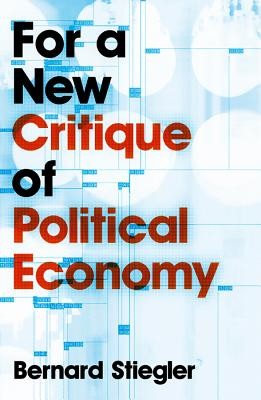
- We will send in 10–14 business days.
- Author: Bernard Stiegler
- Publisher: Polity Press
- ISBN-10: 0745648045
- ISBN-13: 9780745648040
- Format: 12.8 x 19.1 x 1.2 cm, minkšti viršeliai
- Language: English
- SAVE -10% with code: EXTRA
Reviews
Description
The catastrophic economic, social and political crisis of our time calls for a new and original critique of political economy - a rethinking of Marx's project in the very different conditions of twenty-first century capitalism.
Stiegler argues that today the proletarian must be reconceptualized as the economic agent whose knowledge and memory are confiscated by machines. This new sense of the term 'proletarian' is best understood by reference to Plato's critique of exteriorized memory. By bringing together Plato and Marx, Stiegler can show how a generalized proletarianization now encompasses not only the muscular system, as Marx saw it, but also the nervous system of the so-called creative workers in the information industries. The proletarians of the former are deprived of their practical know-how, whereas the latter are shorn of their theoretical practice, and both suffer from a confiscation of the very possibility of a genuine art of living.
But the mechanisms at work in this new and accentuated form of proletarianization are the very mechanisms that may spur a reversal of the process. Such a reversal would imply a crucial distinction between one's life work, originating in otium (leisure devoted to the techniques of the self), and the job, consisting in a negotium (the negotiation and calculation, increasingly restricted to short-term expectations), leading to the necessity of a new conception of economic value.
This short text offers an excellent introduction to Stiegler's work while at the same time representing a political call to arms in the face of a deepening economic and social crisis.
EXTRA 10 % discount with code: EXTRA
The promotion ends in 22d.00:06:56
The discount code is valid when purchasing from 10 €. Discounts do not stack.
- Author: Bernard Stiegler
- Publisher: Polity Press
- ISBN-10: 0745648045
- ISBN-13: 9780745648040
- Format: 12.8 x 19.1 x 1.2 cm, minkšti viršeliai
- Language: English English
The catastrophic economic, social and political crisis of our time calls for a new and original critique of political economy - a rethinking of Marx's project in the very different conditions of twenty-first century capitalism.
Stiegler argues that today the proletarian must be reconceptualized as the economic agent whose knowledge and memory are confiscated by machines. This new sense of the term 'proletarian' is best understood by reference to Plato's critique of exteriorized memory. By bringing together Plato and Marx, Stiegler can show how a generalized proletarianization now encompasses not only the muscular system, as Marx saw it, but also the nervous system of the so-called creative workers in the information industries. The proletarians of the former are deprived of their practical know-how, whereas the latter are shorn of their theoretical practice, and both suffer from a confiscation of the very possibility of a genuine art of living.
But the mechanisms at work in this new and accentuated form of proletarianization are the very mechanisms that may spur a reversal of the process. Such a reversal would imply a crucial distinction between one's life work, originating in otium (leisure devoted to the techniques of the self), and the job, consisting in a negotium (the negotiation and calculation, increasingly restricted to short-term expectations), leading to the necessity of a new conception of economic value.
This short text offers an excellent introduction to Stiegler's work while at the same time representing a political call to arms in the face of a deepening economic and social crisis.


Reviews